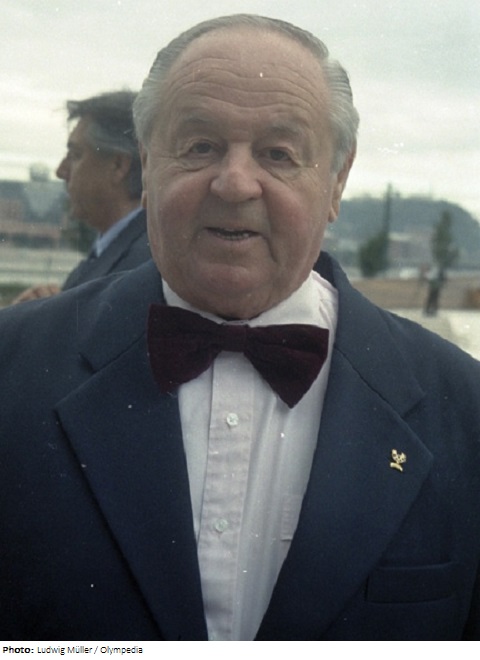
| Roles | Competed in Olympic Games • Non-starter |
|---|---|
| Sex | Male |
| Full name | György•Kárpáti |
| Used name | György•Kárpáti |
| Born | 23 June 1935 in Budapest, Budapest (HUN) |
| Died | 17 June 2020 (aged 84 years 11 months 24 days) in Budapest, Budapest (HUN) |
| Measurements | 167 cm / 71 kg |
| Affiliations | Budapesti Kinizsi/Ferencvárosi Torna Club |
| NOC |  Hungary Hungary |
| Medals | OG |
| Gold | 3 |
| Silver | 0 |
| Bronze | 1 |
| Total | 4 |
György Kárpáti was born in Budapest on 23 June 1935, which is the International Olympic Day. He tried many sports, including diving and two years playing football, before finally choosing swimming, in which he won the Hungarian championship four times. He finally opted for water polo, and despite not being a classic water polo player, compensated with great skill and speed.
To the surprise of many, the national team head coach Béla Rajki, invited Kárpáti onto the squad at just 16-years-of-age. A year later, in 1952, he was a member of the Hungarian team that won the gold medal at the Helsinki Olympics. As of 2020 he remained the youngest male Olympic water polo champion. Kárpáti was a gold medallist again at the 1954 European Championships in Turin, and, despite the turbulent political situation in Hungary at the time, they successfully defended their Olympic title in Melbourne. Kárpáti won a gold medal at the European Championships of 1958 and 1962, and finished third with the national team at the 1960 Olympics in Rome. At the Universiades between 1957-63 he enjoyed a first and third in water polo and second and third as a member of the 4x100 freestyle relay team. In 1964, Kárpáti, along with his team-mate and friend, Dezső Gyarmati, each won their third Olympic gold medal. Kárpáti was also a candidate for the 1968 Games in Mexico, but was not selected. Between 1952 and 1969 he played in a total of 165 games for the national team.
After the 1956 Olympics, Kárpáti was one of the athletes invited by Sport Illustrated magazine to take part in a demonstration tour in the United States. Unlike many of his team-mates, he returned to Hungary and continued where he left off with FTC. He was the pillar of their team, which was the only club of his entire career. From 1945-69 they won both the national championship five times (1956, 1962-63, 1965, 1968), and also the Hungarian Cup five times (1962-64, 1967, 1969).
Although he had a degree in law, Kárpáti never practiced it. He also received a coaching degree in 1964. At the peak of his career, he was assistant coach to Dezső Gyarmati at the men’s national team between 1970-80. Their greatest success was the 1976 Olympics when they won their fourth gold together.
Kárpáti worked abroad as well, coaching the Victoria State team in Australia from 1988-91, with whom he won the championship. In 1982 he was elected to the Swimming Hall of Fame, and had been a member of the Association of Immortal Hungarian Athletes since 1994. He served as President of the Association from 2011 until his death. Kárpáti was also a member of the presidency of the Hungarian Olympic Committee, the FTC, and the Hungarian Water Polo Association.
| Games | Discipline (Sport) / Event | NOC / Team | Pos | Medal | As | |
|---|---|---|---|---|---|---|
| 1952 Summer Olympics | Water Polo (Aquatics) |  HUN HUN |
György Kárpáti | |||
| Water Polo, Men (Olympic) | Hungary | 1 | Gold | |||
| 1956 Summer Olympics | Water Polo (Aquatics) |  HUN HUN |
György Kárpáti | |||
| Water Polo, Men (Olympic) | Hungary | 1 | Gold | |||
| Swimming (Aquatics) |  HUN HUN |
György Kárpáti | ||||
| 4 × 200 metres Freestyle Relay, Men (Olympic) | Hungary | |||||
| 1960 Summer Olympics | Water Polo (Aquatics) |  HUN HUN |
György Kárpáti | |||
| Water Polo, Men (Olympic) | Hungary | 3 | Bronze | |||
| 1964 Summer Olympics | Water Polo (Aquatics) |  HUN HUN |
György Kárpáti | |||
| Water Polo, Men (Olympic) | Hungary | 1 | Gold |